Seneca Falls, New York
On July 19, 1848, the first women's rights convention was held in Seneca Falls, N.Y. For that reason, some people consider it to be the single most important place in U.S. women's history. Seneca Falls was the home of Elizabeth Cady Stanton (her house is pictured above), who, along with abolitionist Lucretia Mott, organized the convention.
Seneca Falls is now the home of the National Women's Hall of Fame and the Women's Rights National Historic Park.
Image source: National Parks Service.
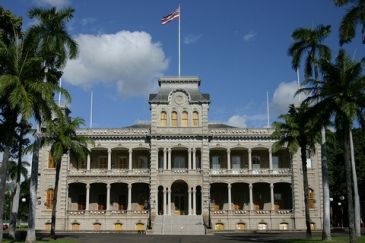
Iolani Palace
The only royal palace in the United States, Iolani Palace in Honolulu, Hawaii was the official residence of the Hawaiian monarchy from 1882 until foreign merchants overthrew Queen Liliuokalani in 1893. The queen was also imprisoned there for eight months in 1895 following efforts to restore her to the throne. Portraits of several Hawaiian queens are on display at Iolani.
Image source: State of Hawaii Dept. of Business, Economic Development and Tourism.
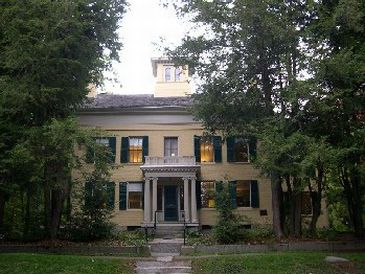
Emily Dickinson House
Poet Emily Dickinson (1830-1886) was born in this house in Amherst, Massachusetts and lived most of her life there, rarely leaving its beautiful grounds. After Dickinson's death her sister Lavinia discovered hundreds of poems hidden in the house. Thanks to Lavinia, these poems were published, and Dickinson is now regarded as one of the greatest American poets.
Image source: The Emily Dickinson Museum.
Harriet Tubman Home for the Aged
For more than a decade, the legendary Harriet Tubman (1820-1913) risked her life to lead hundreds of enslaved people out of the South to freedom in the North. Tubman also worked as a nurse and scout during the Civil War. Her Home for the Aged in Auburn, New York was her last major project. It is now a museum honoring Tubman's life and work.
Image source: Lvklock, Wikimedia Commons.
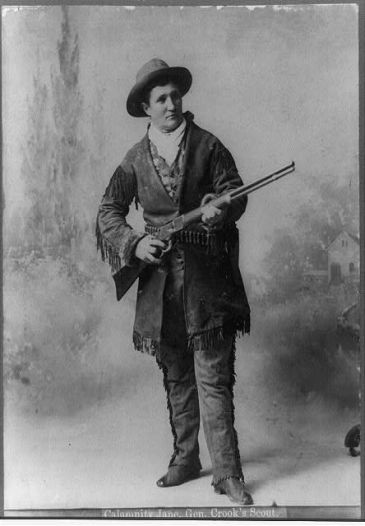
Deadwood, South Dakota
Image source: Library of Congress.
The Jane Addams Hull House
Founded by Jane Addams in 1889, Chicago, Illinios' Hull House may be the most famous of the "settlement houses" that improved life for immigrant families in poor city neighborhoods. Hull House offered classes, daycare, job assistance, and a place for labor unions to organize. Like most other settlement houses, Hull House was staffed mainly by women. The original building is now a museum, while the organization still survives and is active in the Chicago area.
Image source: Public Domain.
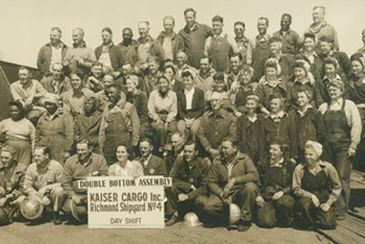
Richmond, California
Rosie the Riveter made her debut in song, but it's the brawny image on the famous poster that's the vivid reminder of the women who took over traditionally male jobs during World War II, pumping out airplanes and ships for the war effort. The Rosie the Riveter Memorial, designed by Cheryl Barton and Susan Schwartzenberg, is near the Richmond, Calif., shipyards where liberty ships were built. It's part of the World War II Home Front National Historical Park, dedicated to those who stayed home to win the war.
Image source: National Parks Service.
Laura Ingalls Wilder Memorial Society
Image source: South Dakota State Historical Society.
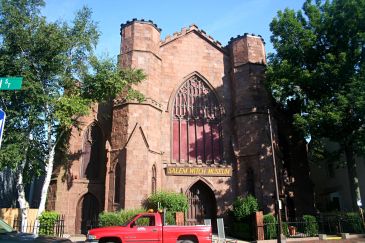
Salem Witch Museum
The Salem witch trials of Salem, Massachusetts started in January 1692, a time when the strange behavior of young girls was cause enough for a trial and hanging. By the time the hysteria ended later that same year, 24 women were dead. Today, Salem is known as Witch City and commemorates these times with tours of sites connected to the trials, including the Witch House, which was actually the house of one of the trials' magistrates. In 1992, a memorial was raised to the victims of the witch hunt. Salem today is much more tolerant of witches--it has even has an honorary position for "the Official Witch of Salem, Mass."
Image source: Rolf Müller, GNU Free Documentation License.

The Walker Theater
After moving from Denver and then to Pittsburgh, African-American hair-care mogul Madame C. J. Walker ultimately based her operations in Indianapolis, Indiana in 1910. She moved to New York City in 1916, but most of the Walker manufacturing remained in Indianapolis, a city with good railroad connections and a healthy African-American population. Her dream to build a multipurpose building for the black community was only realized by her daughter years after her death. The building had a theater, restaurant, offices, and stores, as well as the Walker company operations. The Walker Theater closed in 1965, but it was renovated and reopened in 1988 and is now a National Historic Landmark.
Image source: National Parks Service.
Lowell, Massachusetts
In the 1830s, the mills in the booming industrial town of Lowell employed women almost exclusively. Thousands of young women left their farm homes to live together at Lowell boardinghouses and work in the mills. Today, tours and exhibits and the Lowell National Historic Park bring the contributions of these women to the Industrial Revolution back to life.
Image source: National Parks Service.
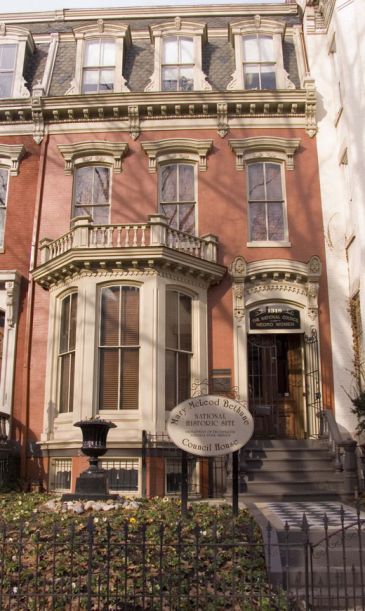
Mary McLeod Bethune Council House
This three-story townhouse in Washington, DC, was the residence of educator Mary McLeod Bethune (1875-1955) and the original headquarters of the National Council of Negro Women. It is now a National Historic Site that hosts a variety of programs. A carriage house in back contains the National Archives for Black Women's History.
Image source: National Parks Service.
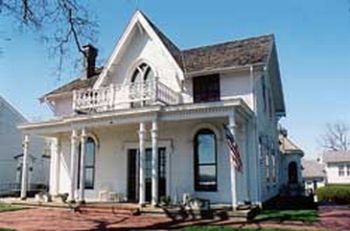
Birthplace of Amelia Earhart
Image source: National Parks Service.
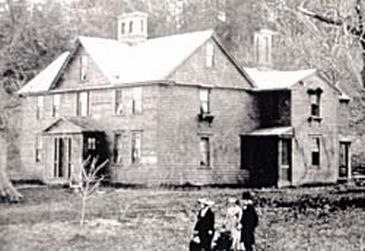
Orchard House
Author Louisa May Alcott (1832-1888) lived in Orchard House in Concord, Massachusetts with her family for nearly 20 years and is thought to have written her classic novel Little Women there. Now a National Historic Landmark, Orchard House is preserved much as it was when the Alcotts lived there. Visitors can tour the home and imagine how the family lived.
Image source: National Parks Service.
Susan B. Anthony House
A National Historic Landmark, this Rochester, N.Y., house was the home and headquarters of feminist Susan B. Anthony (1820-1906) for nearly half a century. Countless meetings to organize for women's rights were held in this house. In 1872, Anthony was famously arrested in the house because she had voted in the presidential election—a criminal act for a woman.
Image source: National Parks Service.
Woodlawn Cemetery
Although the distinguished women who are buried in Woodlawn Cemetery in the Bronx, New York, didn't make their mark there while living, visiting this 400-acre cemetery can be a stroll through the history and culture of the 19th and 20th centuries. Among those interred in the rolling hills are Elizabeth Cady Stanton, Carrie Chapman Catt, Gertrude Ederle, Antoinette Perry, Nellie Bly, Madame C. J. Walker, and Celia Cruz.
Image source: Public Domain.




